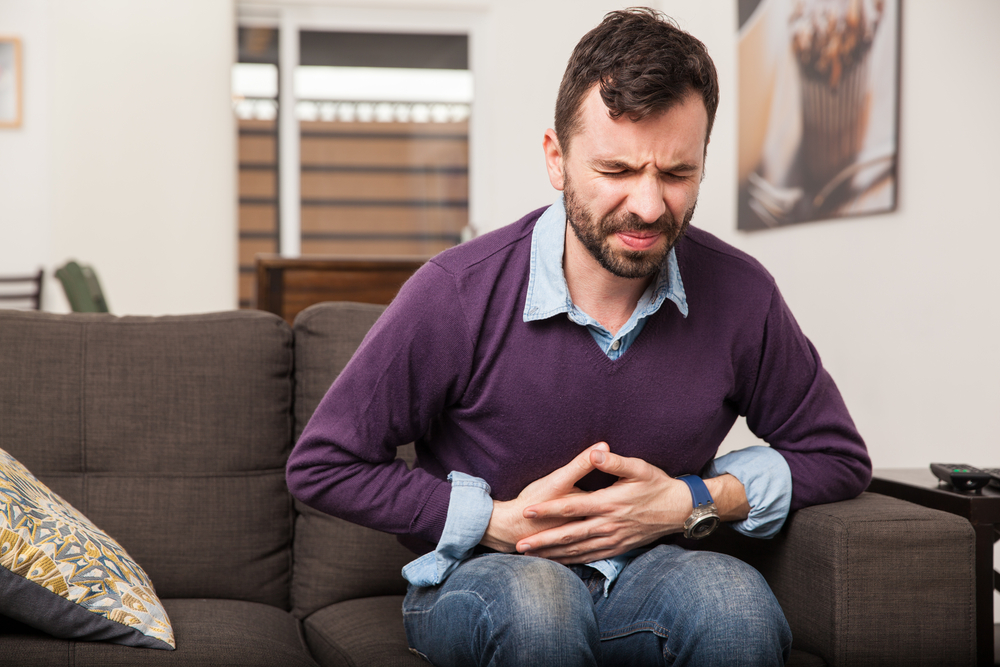Contents:
- Medical Video: 5 common signs of colon cancer
- What are the signs and symptoms of colon cancer to watch out for?
- Symptoms of metastatic colon cancer
- When to see a doctor?
- Stages of colon cancer
- Risk factors that cause colon cancer
- Factors that can be changed
- Causes that cannot be changed
Medical Video: 5 common signs of colon cancer
Early stage colon cancer generally does not show significant symptoms. As a result, many people fail to get a diagnosis early, so the cancer may have spread and been treated too late. Therefore, it is important to recognize the symptoms of colon cancer so that the treatment can be better and more effective.
What are the signs and symptoms of colon cancer to watch out for?
In general, symptoms of colon cancer can include one or more of the following conditions:
- Changes in the texture and density of faeces that last for more than four weeks. For example, your stool is too hard which causes constipation or is too runny, causing diarrhea.
- Feeling that you have to defecate but don't get relief afterwards
- Anus bleeds
- Bloody bowel movements
- Stomach cramps, bloating, or persistent pain
- The body feels tired and lackluster
- Drastic weight loss for no apparent reason
Symptoms of bowel cancer can also cause bleeding. This sometimes results in discoloration of your stool that will appear to be darker. Even so, some people who experience bleeding also often have normal stools. Bleeding that results from colon cancer usually occurs slowly and accumulates over time, causing a decrease in the number of red blood cells (anemia).
Sometimes the most typical symptoms of colon cancer are found when the patient is carrying out a blood test. From the results of blood tests it is known that the patient's red blood cell count is low. Unfortunately, a low number of red blood cells can also be caused by conditions other than colon cancer. If you have an infection, hemorrhoids, irritable bowel syndrome, or inflammatory bowel disease, the results of your blood test may show low red blood cells.
Therefore, if you experience one or several symptoms of colon cancer as mentioned above, do not hesitate to immediately see a doctor. Especially if the symptoms that you complain of are severe, last a long time, and change over time. However, many people with colon cancer don't have any symptoms until the disease develops, so someone needs to be screened regularly.
By being aware of the symptoms of colon cancer, you can detect this disease early. The earlier the disease is detected, the easier the treatment will be and the greater the chance for patients to recover.
Symptoms of metastatic colon cancer
Symptoms of widespread colon cancer (metastasis) depend on the location where the cancer spreads, the size and location of the tumor in the body. Metastatic colon cancer patients are not always aware of symptoms before diagnosis.
- If the bone is affected, symptoms can include pain, fractures, constipation or decreased alertness due to high calcium levels,
- If the lungs are affected, symptoms can include shortness of breath or difficulty breathing, coughing, chest wall pain, or extreme fatigue.
- If the liver is affected, symptoms can include nausea, extreme fatigue, increased abdominal thickness, swelling of the feet and hands due to fluid buildup, and itchy or yellowing skin.
- If the brain or spinal cord is affected, symptoms can include pain, daze, memory loss, headache, double vision or blurring, difficulty speaking, difficulty moving or seizures.
When to see a doctor?
Consult your doctor if you experience one or even some of the symptoms of colon cancer as mentioned above. Especially if the symptoms of colon cancer that you experience have lasted more than a few weeks or become severe. Also consult your doctor if you feel anxious and anxious about one or more symptoms of colon cancer as listed above. Your doctor will usually schedule a colonoscopy to find the cause of the problem you have.
Colon cancer generally occurs in the elderly, but it does not rule out the possibility of even children. Therefore, regardless of age, if you experience or suspect symptoms of colon cancer, you should immediately consult a doctor. The doctor will determine whether you have to undergo a colonoscopy or not. Usually the examination will begin with the question how long and how often you experience symptoms, other medical conditions that you have, the medication you are taking, and your medical history in the family. These things can help find the cause of the problem that you are removing.
If you are diagnosed with cancer, relieving symptoms remains an important part of cancer treatment and treatment. Make sure you talk to your health care team about your symptoms, including new symptoms or changes in symptoms.
Stages of colon cancer
Stadium plays an important role to see the status of your condition. In the case of cancer, the stage is used to find out how far the cancer cells spread to other organs. Stadium can also help doctors find the treatment and treatment that best suits your condition.
Following are the stages or stages of development of colon cancer:
Stage 0.In this stage, abnormal cells are found in the deepest layer of the large intestine. These abnormal cells can become cancerous and spread to the closest normal tissue. Stage 0 cancer is often also called carcinoma in situ.
Stage I. In this stage, cancer cells have formed and began to spread from the deepest layer of tissue in the wall of the large intestine to the closest tissue. But the spread of cancer cells has not yet led to the lymph nodes.
Stage II. In stage II, colon cancer is divided into 3 phases, namely:
- Stage II A. Cancer has spread through the muscle layer to serous (the outermost layer) of the large intestine wall.
- Stage II B. Cancer has spread through serosa (the outermost layer) of the large intestine wall but has not spread to nearby organs.
- Stage II C. Cancer has spread through serosa (the outermost layer) of the wall of the large intestine and nearby organs.
Stage III. In stage III, colon cancer is divided into 3 phases, namely:
- Stage IIIA. Cancer has spread from the deepest layer of tissue in the large intestinal wall to the middle layer and spread to as many as 3 lymph nodes.
- Stage IIIB. Cancer has spread to as many as 3 nearby lymph nodes and has spread out the middle tissue layer in the large intestinal wall, the closest tissue around the large intestine or rectum, or out of the large intestinal wall into the nearby organs and / or penetrate the peritoneum.
- Stage IIIC. Cancer has spread to 4 or more lymph nodes and has spread to or penetrated the middle tissue layer in the wall of the large intestine, or to the closest tissue around the large intestine or rectum.
Stage IV. In stage IV, the cancer may have spread to nearby lymph nodes and spread to other body parts, such as the liver or lungs.
Knowing the stage and stage of development of colon cancer can help doctors decide which treatment plan best suits your needs. When diagnosed with colon cancer, you can ask your doctor to explain the stage of your cancer.
Risk factors that cause colon cancer
Until now the main cause of colon cancer is still not known with certainty. But there are some things that can increase a person's risk of developing colon cancer cells, both those that can be changed and those that cannot be changed.
However, it has risk factors, or sometimes some risk factors do not mean that you will get colon cancer. Some people with colon cancer don't even have risk factors. This means that everyone may have a higher chance of developing colon cancer.
The following risk factors that can cause colon cancer are:
Factors that can be changed
Risk factors for altered colon cancer can be affected by an unhealthy lifestyle. This includes:
- Dietary habit.A poor diet can be a reason for someone having colon cancer. This diet includes excessive consumption of fatty foods such as red meat and processed meat. Not only that, improper cooking methods can also lead to colon cancer. The cooking method in question is cooking (especially cooking meat) with high temperatures, which causes an increase in a certain chemical compound that triggers the occurrence of cancer in the intestine.
- Lack of physical activity. People who are lazy to move, do not like sports, and tend to live a sedentary lifestyle are certainly more at risk of developing colon cancer than those who are diligent or routinely doing physical activity. Even lack of physical activity not only increases the risk of developing colon cancer, but other chronic diseases.
- Consuming large amounts of alcoholic beverages. Eating all kinds of alcoholic drinks too much will increase your risk of developing colon cancer. Limiting or even avoiding the consumption of alcohol altogether will reduce the risk of developing colon cancer.
- Smoke.This one behavior has been known as a risk factor for various cancers including colon cancer. The longer you smoke, the greater the risk of colon cancer. Although it's not easy to stop smoking, it doesn't mean you can't do it at all. The key is intention and consistency. Remember, reducing or even stopping smoking not only prevents you from getting cancer, but improves your overall health.
- Overweight.Obesity or obesity can increase the risk of cancer cell growth and increase the risk of death from cancer. The risk of getting cancer because obesity is greater is found in men than women. One effective way to overcome this condition is to increase physical activity and pay attention to the food intake that you consume daily.
Causes that cannot be changed
There are several risk factors that cannot be corrected to reduce the risk of developing colon cancer, among them
- Elderly. Elderly or people over 50 years of age have a higher risk of cancer, including colon cancer. Cancer requires time to develop from abnormal cells, so in many cases, some people will be diagnosed with cancer in old age.
- History of suffering from polyps or colon cancer. Someone who has been declared cured of colon cancer or polyps can experience recurrence. This recurrence begins with the growth of new cancer cells in the intestine. This risk will be greater if someone has had colon cancer at a young age.
- Ever experiencedinflammatory bowel disease (IBD). IBD or also known as inflammatory bowel disease (colitis) is a disorder that causes the digestive system to become inflamed. Inflammation that has occurred has been going on for a long time. The intestinal wall of people with IBD experiences abnormal cell growth when viewed with a microscope (dysplasia) If you have ever been diagnosed with this one disease, do colon cancer screening regularly. IBD is different frominflammatory bowel syndrome (IBS) which does not increase the risk of colon cancer.
- Has a family history of colon cancer. Your risk of developing colon cancer will be higher if there is one of your parents, blood relatives, or children who suffer from this type of cancer. In addition, the risk a person has will be higher if one family member has had colon cancer under the age of 45 years. Cancer conditions can be reduced in one family due to genetic factors or influenced by environmental factors or interactions between the two. Although most sufferers do not have a family history of this disease, but with a family history will increase the risk by 20 percent of colon cancer.
- Have a family history withfamilial adenomatous polyps. The same is true with a family history of having experienced the growth of potentially cancerous polyps,adenomatous polyps. If there are family members who experience it, do detection of colon cancer regularly.
- Have a history of diseasetype 2 diabetes. Someone with a history of type 2 diabetes has a higher risk of colon cancer than those without a history of the disease. Both diabetes or colon cancer have many similar risk factors, such as obesity. Although there are no other risk factors, someone with diabetes has a higher risk of colon cancer.

















